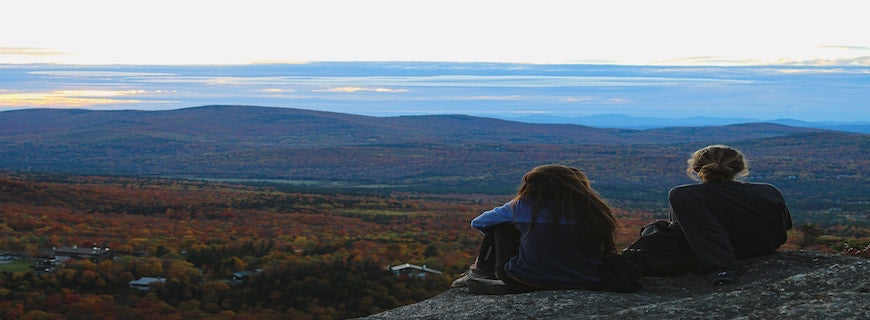Nature lovers the world over have attested to the power of the great outdoors for boosting health and wellbeing. We’ve always intuitively known that time in nature is good for us. But it’s only recently that science has begun to back up our long-held beliefs.
Nature affects human health in many ways. Trees, in particular, provide food, shelter, medicine and offer a firm footing that prevents flooding and landslides. Conversely, they harbour insects, produce pollen and can be a hazard in high winds.
Undoubtedly nature impacts human behaviour and experiences. People love to go into nature, forests and oceans to unwind and relax.
Nature therapy is increasingly popular as a free and easy approach to boosting health. But what does science say?
In this article, we’ll take a closer look at some scientifically-backed health benefits of nature, and answer the question: how does nature improve mental health?
Why is nature so important to humans?
Most people think of health as a state free from disease. More accurately, the World Health Organization (WHO) describes health as “a state of complete physical, mental and social well-being, and not merely the absence of disease or infirmity.”
While this may err on the side of unrealistic and utopian, it does allude to the inclusion of all aspects of health.
When we view health as multi-dimensional, it’s easier to understand how time in nature could impact wellbeing.
Rather than viewing health (or lack thereof) through the lens of symptoms that are in need of treatment.
Time in nature has many implications, such as the ability to improve focus. As well as physical and biochemical foundations that support balance and harmony.
What do we mean by nature?
We’ll be referring to nature as the natural features and processes that people can perceive without the use of specialised instruments.
Nature in a broad sense – related to trees, forests, vegetation, animals, wind and weather, sunlight and the ocean.
In essence, we’ll be exploring how the natural environment, that has had little human intervention, impacts the health of humans.
Promoting nature isn’t a lucrative endeavour. Perhaps that is why we are only now seeing an explosion of studies supporting its benefits.
“Spending time in nature certainly makes us feel healthier, but until now the impact on our long-term wellbeing hasn’t been fully understood.” – Caoimhe Twohig-Bennett, UEA Norwich Medical School
1. Increased Self-Esteem
Children who participated in a 2016 research study on the effects of nature on health, showed improved concentration and self-esteem.
Time in nature allowed them to take risks, get creative and discover the great outdoors.
In some children, the symptoms of Attention Deficit Hyperactivity Disorder (ADHD) were reduced as they got better at focusing.
In other research, it was found that spending more time in nature could lead to a more positive body image. “It is possible that exposure to environments with depth and complexity restricts negative appearance-related thoughts,” speculated Viren Swami, professor of social psychology at Anglia Ruskin University and lead author of the study.
2. Greater Overall Health
According to a massive study of over 290 million people published by the University of East Anglia, those who spend more time outdoors report overall good health.
This was backed up in the Wildlife Trust study in point one. Where those reporting that their health was “excellent” increased by 30% after 30 consecutive days taking time to “go out in the wild.”
3. Natural Aromatherapy
It’s common practice for Japanese people to forest bathe – this practice is known as “Shinrinyoku.”
Interestingly, they point to the natural aromatherapy as one of the health benefits of spending time in the forest.
This theory is backed up by a recent 2020 study into how smells of nature can lower psychological stress. In the study, virtual reality headset scenes were coupled with sounds and smells that correlated to the perceived location.
For example, tar and gunpowder smell with cityscapes and the smell of grass, fir trees and mushrooms in the virtual nature scenes.
Interestingly, it was the smells in particular that affected people most.
4. Long-Term Boosts to the Immune System
In a Japanese study, male and female participants spent 3 days in the forest, with 2 nights of sleep. Blood and urine samples were taken to measure Natural killer (NK) cells and levels of urinary adrenaline before, during and after their stay in the woods.
Researchers found increased NK activity, which is a signifier of an enhanced immune system.
Amazingly, this rise in NK cells persisted for 30 days after the trip.
It’s possible that the phytoncides released by the trees may be responsible for some of the immune-boosting qualities of spending time in green space.
Phytoncides are organic compounds with antibacterial properties, which may explain an underlying scientific mechanism by which trees boost health.
5. Reduced Stress Levels
Our Japanese study (above) also showed that the levels of adrenaline in the urine of participants was significantly lower on the days they spent in the forest.
This could be due to a combination of factors, a lack of overwhelming digital stimulus, smells of nature or physical exercise.
Stress is measured both in spikes of adrenaline and also cardiovascular activity.
A simple walk in the forest can have favourable cardiovascular responses, balancing out the whole human organism.
Because humans have evolved to adapt to their surrounding environment, natural stimulation via forests or green spaces can enhance both physiological and psychological relaxation.
Learn More: The Connection Between Adrenal Fatigue, Stress & Water
The Bottom Line
The many health benefits of spending time in nature can be attributed to increased physical activity and the antibacterial substances emitted by the plants.
Does nature make us healthier? Absolutely! A raft of studies are showing that nature therapy is a free and easy tool to boost overall wellbeing.
In our increasingly hectic, stressed, technology- and image-obsessed age, there are few things better than to disconnect and embrace the simplicity and beauty of the natural world. The benefits of exercising outdoors are also significant.
Written by best-selling author and integrative nutrition health coach Rowanna Watson, who has a passion for natural health. Rowanna is an expert in all areas of holistic health, plant-based nutrition, detoxification and personal development.
Water for Health Ltd began trading in 2007 with the goal of positively affecting the lives of many. We still retain that mission because we believe that proper hydration and nutrition can make a massive difference to people’s health and quality of life. Click here to find out more.




























Leave a comment